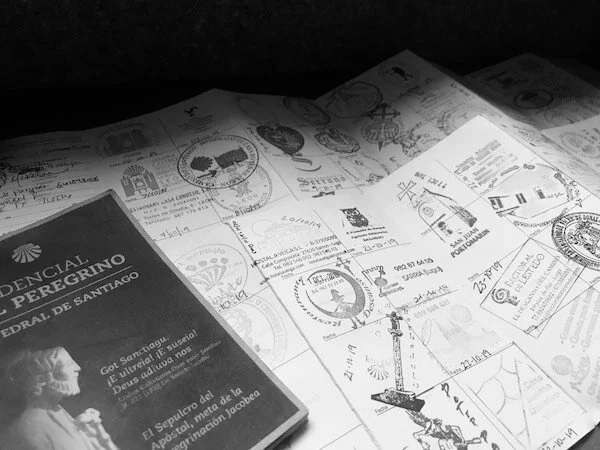Sellos and Sin
Credential, filled with sellos from each day.
“How was your Camino?”
People have been doing this for centuries, even before Christianity. They walk for all sorts of reasons: to heal, to nurture health, some government jobs in Spain even require you to have walked the Camino and earned your Compostela. Here’s how that works: we can purchase a credential; consider it a pilgrim’s passport. Each place along the Way we stop (our albergue or hotel, a cafe/bar, a church, a shop, etc) is likely to have a stamp, called a sello (pronounced “sey-yo”) with which you can stamp your credential. Collect sellos along the Way each day, and when arriving to Santiago, venture to the Pilgrim’s Office. They’ll assess the credential(s) - we spilled over into two and three by the time we reached Santiago - and award you the Compostela.
The Compostela has, in history, held the significance of absolving a person of all their sins. A walk along the Camino has taken me through mud, rain, up mountain and hill after incline and incline, down steep and slick rocky descents, on long hard arduous days where the soles of my feet ache and my calves and hamstrings sting. I have been physically tired and still had to muster more energy to arrive and complete the work. I have carried too much, found my pack too heavy, and pondered what I’m still carrying in my life that perhaps I could release for my larger journey. Especially when we move through bucolic countryside, it’s raining, I’m venturing up the 70th steep hill, and I can no longer tell if what I’m climbing through is mud or farm feces, I’ve thought this had some good ‘sin-absolving’ potential. It certainly has given me time to think about the choices I’ve made that weigh me down and the ones that give me energy, the things from and towards which I try to run, and the ways I’ve felt failed and injured by others and ways I’ve failed and injured others.
Could all my shortcomings, injuries, and woundedness be pardoned with the receipt of the Compostela?
Perhaps I arrive and am released from my sins, yet there will still be more steps, climbs, mountains, and heaviness ahead (and within!) to take and release; more softness to embrace, more death and rebirth to cycle through. I live, guaranteed to encounter my inward struggling self again and again.
One becomes a marathoner by putting the kilometers/miles on my shoes, feet, body, breath, by running and journeying the 26.2 miles to arrive at the finish line. Step after step, mile after mile, of commitment to that journey until it is finished, makes the body and soul capable of the journey it has undertaken.
In this Camino case, the day-after-day, step-after-step, mountain-after-mountain, sello-after-sello, has been transforming my body and soul from who I was when I began to a person more set free from that which has burdened me.
I have witnessed numerous ways we have walked ourselves into healing, and in earning our Compostela we receive confirmation of the work we’ve already been arriving to each day, the work of grace and community and inner strength and release, the work of encountering Spirit and Christ along the Way, the work of presence and gratitude and practicing abundance. Along with this certificate of accomplishment, I suspect we carry home with us a posture of walking, arriving, receiving, releasing. For I believe it is in this that the work of transformation has occurred, has begun, and will continue to unfold.
Compostela received in Santiago, written in Latin.


